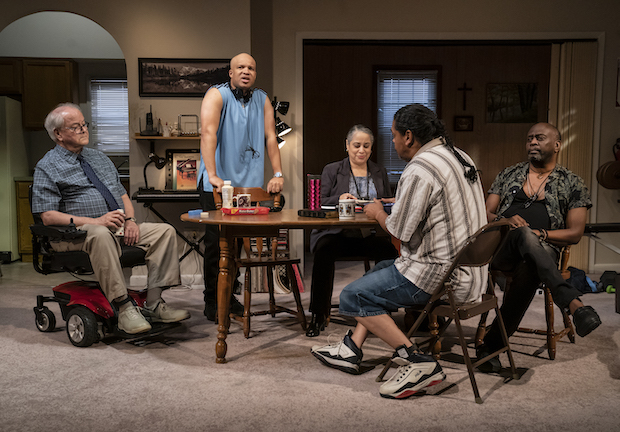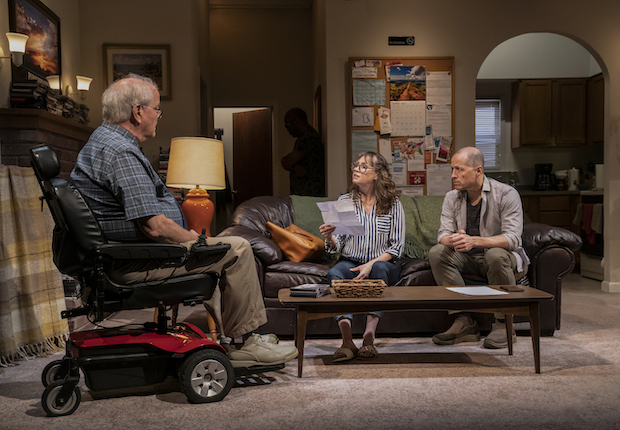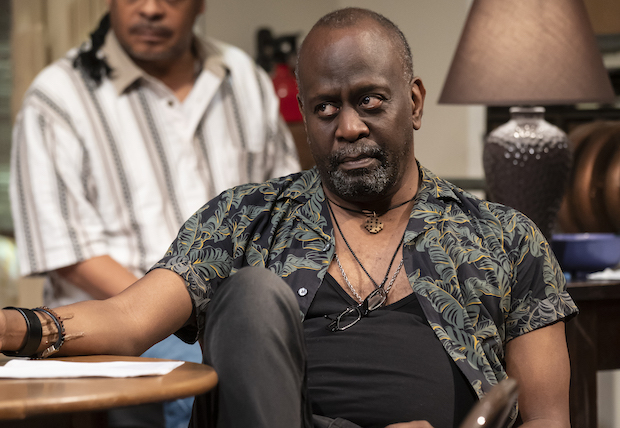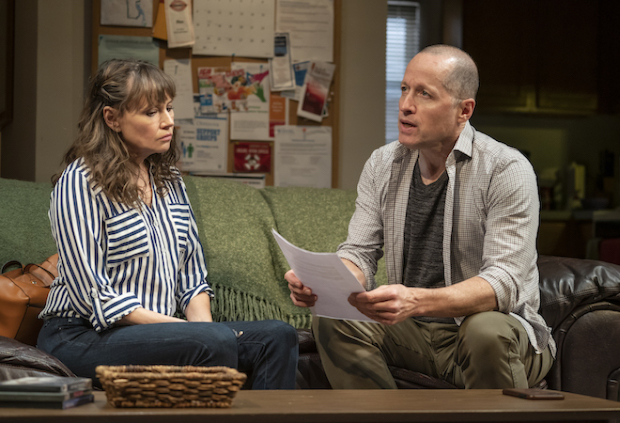Review: Downstate Offers Sympathy for Sex Offenders and Scrutiny for Victims

(© Joan Marcus)
"Victims don't lie," a character confidently claims in Downstate, the provocative new drama by Bruce Norris, now making its New York debut at Playwrights Horizons. And in saying this, he is only regurgitating a bit of dogma that has been repeatedly affirmed by the dominant culture — particularly since the #MeToo movement of 2017. If you're like me, you hear such sentiments and a little voice in your brain whispers, bullshit.
In Downstate, that voice belongs to Dee (K. Todd Freeman, giving one of the most exhilarating performances of the last several seasons). Dee is the unlikely conscience and emotional center of this play. Like his housemates Fred (Francis Guinan as a human Pooh Bear), Gio (a hot-blooded Glenn Davis), and Felix (furtive Eddie Torres), he is a convicted sex offender. Dee maintained a two-year sexual relationship with a 14-year-old boy when he was in his 30s, a relationship Dee insists was consensual — but that is immaterial when the law does not recognize the ability of a 14-year-old to consent. Dee spent 15 years in prison for his crime and has now landed here.
They live in this crowded and depressing group home in downstate Illinois not because they like one another (it's quite the opposite), but because they have no better option. Outfitted with ankle monitors, they are closely watched by parole officer Ivy (Susanna Guzmán, skillfully playing both good cop and bad cop, a potent symbol of an overstretched social service). They subsist through low-wage jobs and government benefits. And still, their lives are further restricted when they are banished from shopping at a supermarket that falls within a 2,500-foot radius of a school. For those Americans concerned about the rise of a Chinese-style surveillance state, know that it already exists for men like this.

(© Joan Marcus)
But isn't it correct to protect society from potential repeat offenders? Shouldn't criminals expect punishment? Will the time they serve ever make up for what they did? Norris throws these questions onstage from scene one, which shows Fred, a former piano teacher now confined to a Jazzy, listening to Andy (Tim Hopper) read a letter about the lasting harm Fred caused when he sexually molested Andy, who was only 12 at the time. Meant to be a powerful moment of catharsis, Andy's reading is repeatedly interrupted by ringing phones and intruding roommates. And then there's Fred, who responds to lines like, "I used to fantasize about how I would kill you," with a mildly encouraging "Okay."
This produces the first of many laughs throughout this 2-hour, 30-minute tragedy, which Pam MacKinnon directs with the taut timing and precise staging of a farce. She is aided in this balancing act by Todd Rosenthal's set, with its many doors and hiding places, its struggling-to-stay-cream carpet conveying wall-to-wall despair. Adam Silverman's natural lighting peeks in behind drawn blinds, while the blare of a car horn in the driveway (sound by Carolyn Downing) beckons them outside. Costume designer Clint Ramos offers a sense of how these characters see themselves, enhancing performances that are already layered and specific. With this excellent cast, it is possible to both sympathize with the men and suspect that they would offend again, if given the chance.

(© Joan Marcus)
The most fascinating performance of the evening is Freeman as Dee, whose quick wit might have made him the star of gay brunch under different circumstances. Freeman makes us feel Dee's struggle to hold his tongue and not seize the rhetorical marshmallow on the plate before him — but he just can't help himself: When Andy refers to himself as a "survivor," Dee comments under his breath, "Not a lotta cases of death by blow job." We suspect that he ceased to be punished for his original crime long ago and is now kept in purgatory for his mouthiness (Ivy all but confirms this). Nevertheless, she persists — and this makes Dee an unexpectedly heroic figure, a spirit unbroken by his tumble into society's subbasement.
Norris shows his hand by making Andy a financier from Chicago who drove his Audi downstate to harangue Fred into signing a reconciliation contract — which involves Fred confessing to the acts he did (and a few he insists he didn't do). His accompanying wife, Em (a legitimately scary Sally Murphy) is the kind of woman for whom the term "Karen" seems too kind. Hopper speaks Andy's lines, many of which devolve into psychobabble cliché, with a forced calmness that seems to be holding back a reservoir of rage, and we feel the deluge when this infrastructure bursts.

(© Joan Marcus)
These are the exact kind of people for whom Norris has always reserved his most biting satire in plays like The Low Road, Domesticated, and The Pain and the Itch: spoiled members of the American upper-middle class grasping at pseudo-science and trading on the currency of victimhood in order to justify their malice. They come off no better here, dissolving into hysterics the moment anyone questions their lived experience. Perhaps Norris places his thumb on the scale too much in favor of Dee and his ilk to make Downstate a truly balanced drama; but when such people are mostly viewed as the damned, maybe a play like this is the balance.
In a time of brittle orthodoxy on the left and hyperventilating rhetoric about groomers on the right, Downstate has something to offend everyone. (It is remarkable to consider that it made its world premiere at Chicago's Steppenwolf in 2018, when #MeToo was still burning hot — a testament to the bravery of that theater.) Norris takes aim at the hypocrisy of a society that claims to value redemption but makes it impossible for all but the very rich. He also skewers a culture that evangelizes bodily autonomy and consent while endorsing the most brutally coercive tactics of the state (Gabi Samels tells this story most clearly in a hair-raising supporting performance). All of that makes Downstate the must-see play of the fall. It powerfully reclaims the stage as a home for dangerous ideas, a place where the thoughts we would rather ignore confront us — not with startling moral clarity, but sublime doubt.











